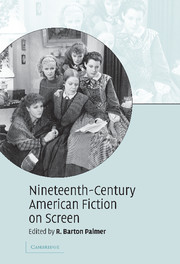Book contents
- Frontmatter
- Contents
- List of illustrations
- Notes on contributors
- Acknowledgments
- Introduction
- 1 A very American fable: the making of a Mohicans adaptation
- 2 Romancing the letter: screening a Hawthorne classic
- 3 The movies in the Rue Morgue: adapting Edgar Allan Poe for the screen
- 4 Readapting Uncle Tom's Cabin
- 5 Screening authorship: Little Women on screen 1933–1994
- 6 Melville's Moby-Dick and Hollywood
- 7 Screening male sentimental power in Ben-Hur
- 8 John Huston's The Red Badge of Courage
- 9 Translating Daisy Miller
- 10 Jane Campion's The Portrait of a Lady
- 11 The Europeans – and the Americans
- 12 Sister Carrie becomes Carrie
- 13 Hollywood and The Sea-Wolf
- 14 An untypical typicality: screening Owen Wister's The Virginian
- Filmography
- Index
12 - Sister Carrie becomes Carrie
Published online by Cambridge University Press: 22 December 2009
- Frontmatter
- Contents
- List of illustrations
- Notes on contributors
- Acknowledgments
- Introduction
- 1 A very American fable: the making of a Mohicans adaptation
- 2 Romancing the letter: screening a Hawthorne classic
- 3 The movies in the Rue Morgue: adapting Edgar Allan Poe for the screen
- 4 Readapting Uncle Tom's Cabin
- 5 Screening authorship: Little Women on screen 1933–1994
- 6 Melville's Moby-Dick and Hollywood
- 7 Screening male sentimental power in Ben-Hur
- 8 John Huston's The Red Badge of Courage
- 9 Translating Daisy Miller
- 10 Jane Campion's The Portrait of a Lady
- 11 The Europeans – and the Americans
- 12 Sister Carrie becomes Carrie
- 13 Hollywood and The Sea-Wolf
- 14 An untypical typicality: screening Owen Wister's The Virginian
- Filmography
- Index
Summary
Carrie, the 1952 adaptation of Theodore Dreiser's (1871–1945) Sister Carrie (1900) starring Laurence Olivier, Jennifer Jones, and Eddie Albert, has never been judged one of William Wyler's better films. Contemporary critics found its style “surprisingly conventional” and “static,” and Bosley Crowther, film critic of the New York Times, dismissed it as “a violently sentimental version of Mr. Dreiser's ironic tale of love and its deterioration.” In the ensuing decades, literary critics have echoed Crowther, Carolyn Geduld faulting Wyler for subscribing “to the suburban moral code” and for creating a “bourgeois heroine,” and Lawrence E. Hussman concluding that distortions of Carrie “render the film nearly unrecognizable to the novel's admirers.”
The “fidelity approach” that these critics take, Brian McFarlane declares, is “a doomed enterprise” because it is simply “unilluminating.” Some things can be “transferred” from novel to film, but much “necessarily requires adaptation proper,” that is, “equivalences in the film medium.” Showing a postmodernist bent, Robert Stam argues that a source novel “can generate any number of critical readings and creative misreadings,” for it is “a dense informational network, a series of verbal cues that the adapting film text can then take up, amplify, ignore, subvert, or transform.” Wyler was a skilled filmmaker who admired Dreiser's work. Even though he ignored some aspects of the novel, including virtually all of its dialogue, he took up much else, sometimes amplifying, sometimes subverting, sometimes transforming it through numerous “equivalences.”
- Type
- Chapter
- Information
- Nineteenth-Century American Fiction on Screen , pp. 186 - 205Publisher: Cambridge University PressPrint publication year: 2007
- 1
- Cited by



